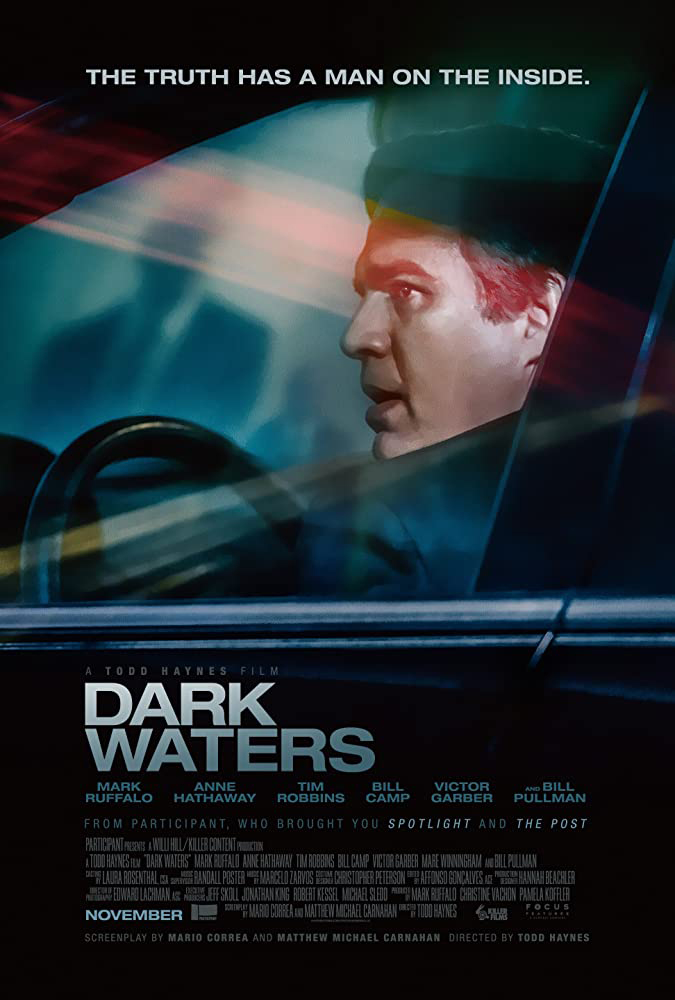Todd Haynes’ legal thriller “Dark Waters” is a dramatisation of a lawyer’s battle to uncover how the chemical manufacturing corporation DuPont contaminated a town, and a country, with its unregulated chemicals. The film is based on “The Lawyer Who Became DuPont’s Worst Nightmare”, a 2016 New York Times Magazine article – and yet the film, stylistically and thematically, presents a world where the real nightmare that depicted is one that we are living in. The present. Despite its genre classification, “Dark Waters” is a horror story of our world and for our world.
When it opened at the end of last year, “Dark Waters” seemed to be overshadowed by glossier films, despite its positive reviews. It barely managing to recoup its 20-million-dollar budget, and little about the film suggests an immediate crowd pleaser. Still, a few months later, the existential dread and scepticism that lingers through every deliberately colourless frame of this quasi legal-biopic feels too prescient and apt for words. And suddenly, “Dark Waters” feels like just the kind of film to tap into the encroaching existential dread that’s seeping through the world. Although it traces a decades-long fight against corporate America that begins in the late nineties, “Dark Waters” is very much feels like a film of the present moment – it feels preternaturally suited to April, 2020.
After a brief prelude that perversely seems like a riff on the opening of “Jaws” (ominous foreshadowing, that we do not immediately realise) the film jumpstarts when corporate defence lawyer Robert Bilott is visited by a farmer from West Virginia, who needs help investigating a string of unexplained livestock deaths that seem suspiciously tied to the manufacturing corporation DuPont. The screenplay, at first, situates this as a David vs Goliath legal battle. Bilott is sceptical of Tenant, the farmer. He acquiesces to the case more out of awkward diffidence than anything else, but the undertones of dread become overtones of horror as Haynes ekes up the tension drawing us into the inevitable truth with the same earnestness with which Bilott recognises the rot of the company he is investigating.
Even before we have the proof, we know that DuPont is guilty. Bill Camp’s earnestness as trenchant farmer William Tenant is hard to refute. He is the exact pillar of rural strength and clarity that Haynes needs to ground the film, and it’s with that surety that the ominousness builds. But, “Dark Waters” is not a tale of a single lost and won battle. By the third of the way into it (its 126 hour running time is efficiently deployed), we recognise that things are skewed beyond measures here and little by little Haynes begins to increase the dread seeping into the atmosphere until “Dark Waters” becomes a horrific interrogation of contemporary America as an underbelly of capitalistic greed.
“Dark Waters” leans into complications in ways that are instructive and complex. Haynes’ overarching mood here is one of melancholy so that the fleeting joys and wins of this impossible battle are reflected with the same filter of the scarring losses. It’s a stylistic choice that’s, at first, confounding but builds overtime to make an argument about the difficulty of being resilient in a constricting world. “Dark Waters” recognises (and credit to Mario Correa and Matthew Michael Carnahan for a restrained screenplay) the value and the costs of being a man alone fighting against a machine. Its representation of crusading becomes a sobering depiction that paints a specific image of a struggle that feels exhausting. Ed Lachman’s cinematography, emphasising the pervasive sadness, is Haynes’ best asset here. Every frame punctuates the narrative with shades of grey unease and uncertainty, which become the fulcrum that the film’s anger is built on. The pallid muteness of the colours is harrowing match for the psychological despondency that grounds the work. Grim is the word here, and yet “Dark Waters” is clear-eyed about the way capitalistic ventures are inherent in the world, and it feel especially apt right now as capitalistic enterprises around the world are faced with the question of altruism during a global pandemic or contributing to capitalist exploitation.
There are bumpy bits along the way, but “Dark Waters” significance is made manifest in the way it mixes the tender with the anxious. If the whispered overtures of the film’s themes, that the world we inhabit might be slowly killing us feels a bit too paranoiac for present circumstances, “Dark Waters” is thoughtful enough about the value of fighting a battle that seems unwinnable that’s not filtered through unrealistic ideas, but deliberate in its clarity. The film’s ending – a risky and provocative thing that is more of an opening than a close – affirms the film’s own uncertain ambivalence. “Dark Waters” presents a question, and not an answer, but it’s a rousing interrogation that feels too valid to ignore right now.
Dark Waters is available on AmazonPrime Video, iTunes Store and Google Play






